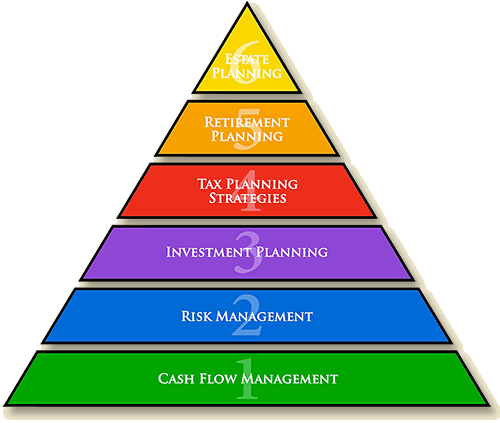Six Areas of Financial Planning
Demystifying Financial Planning.
Financial planning does not need to be mysterious. What it requires is taking a careful look at your individual goals and deciding how you intend to achieve them.
Once you determine what you want, you can make plans to help you move from vision to reality, from where you are now to where you want to be in the future.
With planning, you have a much better chance of achieving your goals than if you fail to plan. A well-conceived, properly-implemented financial plan can help you:
- Reduce taxes
- Plan for retirement
- Decide how to invest
- Assess your insurance needs
Personalized Solutions.
Our custom-designed strategies help you achieve your unique goals, whether it is buying a home or condo, retiring early, financing your child's education or any other goals you may have.
Using the PlanViser® Seven Stage System®, we can help you develop a written financial plan that's right for your life, assist you in building financial freedom, and equip you to protect perhaps your most valuable asset – your financial well-being.
Six Areas of Financial Planning.
There are six vital areas addressed in a properly-designed financial plan. We've depicted those areas in the form of a pyramid to show how one area builds upon another. Many people start at the foundation of the Financial Planning Pyramid and work their way up. You might choose to start with the area most important to you right now.
Action in one area affects all the others, we are here as your personal guide to develop a personal financial plan that addresses all six areas to help you be the most effective in achieving your goals.

Strategic Conversations.
We created some questions to help guide our conversation around these six areas. Take a quick read through the following sections, get prepared, and we will dig into providing insight into your personal situation when we meet.
Cash Flow Management
Every financial plan must include an accurate understanding of your income and expenses today and in the foreseeable future.
- Do you know how much money you earn from all sources (i.e., your inflows) and how much you spend each month (i.e., your outflows)?
- Do you have enough money to cover your necessary expenses, or do you find yourself having more month than money?
- Are you spending money you should be saving?
Risk Management
A complete financial plan helps you manage the risks that could undermine your goals, deplete your assets, or threaten your income.
- If you lost your job or became sick or were injured, how would you pay your bills?
- If something were to happen to you, would your spouse and children be able to remain in your home and live in the world to which they have become accustomed?
- Would your children be able to afford college if you were no longer generating income?
Investment Planning
In this area, we help you find ways to utilize investment strategies and vehicles best suited to your temperament and personal planning objectives.
- Are you getting a return on your investments consistent with the level of volatility you assumed?
- Do you feel you understand the different investment alternatives available and can identify the ones that best suit your individual circumstances?
- At this point in your life is wealth accumulation your primary objective, or are you more concerned about generating current income?
Tax Planning
Tax planning is addressed in each section of your plan as it relates to that specific area.
- Are you familiar with the latest tax laws and how they affect you?
- Are you comfortable with the portion of your income you share with Uncle Sam and the State?
- Are you taking advantage of the tax avoidance strategies available to you?
Retirement Planning
Once your goals for retirement are established, you can build a plan to achieve them.
- Do you think you're too young to plan for retirement or, if you've already retired, that there's not much you can do about it?
- Do you believe your current financial program will allow you to live comfortably for 15, 20, or even 30 years after you retire?
- With respect to your retirement savings programs, is it return on investment or return of investment that concerns you most?
- Are you concerned about the possibility of outliving your money?
Estate Planning
Developing an estate plan can help maximize the amount of money you leave your beneficiaries.
- Are you sure your assets will be utilized the way you want and will reach the people you want them to after you're gone?
- If you became incapable of managing your affairs while alive, will your finances continue to be managed properly and effectively?
- If you own a business, were you aware the IRS has a liquidation plan for your business and estate? Did you know the IRS liquidation plan doesn't include your family?
